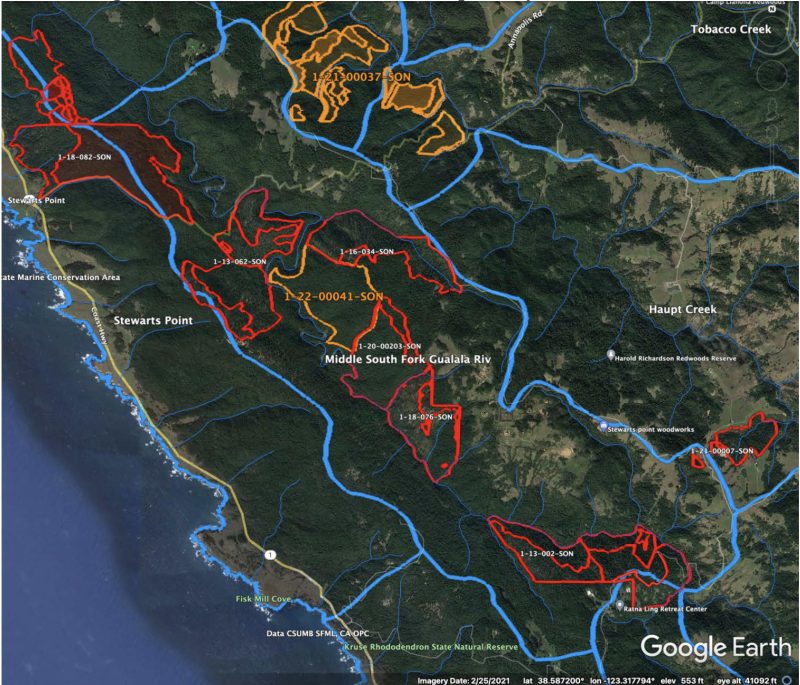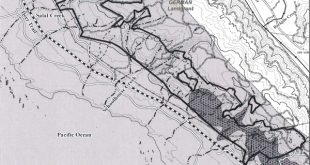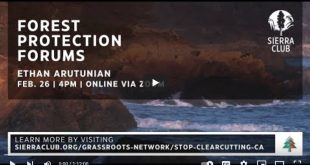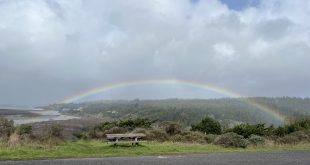For Immediate Release, August 5, 2023
Contact:
Ethan Arutunian, Friends of the South Fork Gualala, info@fosfg.org, 206-353-3487
Daniel Garrett-Steinman, Garrett-Steinman Law Offices, dan@dpgslaw.com, 415-996-7823
SANTA ROSA, CA – In a legal victory for the Gualala River watershed, Sonoma County Superior Court Judge Bradford DeMeo has ordered the California Department of Forestry and Fire Protection (CAL FIRE) to annul and set aside its approval of logging hundreds of acres of critical redwood and fir forest along the South Fork of the Gualala River. The controversial “Bootleg” timber harvest plan (THP) submitted by Richardson Ranch LLC has been opposed by local residents and conservationists through public comments and litigation since first proposed in December, 2020.
Judge DeMeo concluded in his final ruling that the logging plan failed to comply with the California Environmental Quality Act (CEQA), the state’s highest standard of environmental protection. The Court agreed with the plaintiff, Friends of the South Fork Gualala (FoSFG), finding that the plan lacked any meaningful analysis or discussion about impacts on sedimentation, on biological resources, on cultural resources, the cumulative impacts from previous logging in the area, and in its analysis of alternatives.
In a blow to CAL FIRE, the Court also ruled that the timber harvest review process cannot defer to the Forest Practice Act (FPA) and Forest Practice Rules (FPR) alone when considering significant impacts to the environment: “Nothing indicates that compliance with the FPR automatically means, for example, that a THP will not cause significant environmental effects… a THP such as this must also satisfy CEQA. It must provide the level of substantial evidence and analysis which CEQA requires [and] comply with the higher standards of CEQA.”
The ruling is considered a major win by environmentalists, who see this particular issue as an ongoing fundamental problem with CAL FIRE timber harvest plan reviews. Traditionally, review teams cite compliance with the FPA and FPR as the primary reason for approving a logging plan, virtually ignoring the requirements of CEQA.
“This ruling is what California needs right now,” said Ethan Arutunian, co-director of FoSFG. “CAL FIRE has been hiding behind the Forest Practice Rules to circumvent CEQA for years. They approve nearly every logging plan without proper consideration of the cumulative impacts that are occurring on the local environment.”
The Middle South Fork Gualala watershed is almost entirely owned by Richardson Ranch LLC and consists of under 6,500 acres of forestland along the South Fork of the Gualala River. In the past 10 years, over 35% of that forestland has been heavily logged, significantly more than any other watershed in Sonoma County. Commercial logging operations at the Ranch are run by Falk Forestry LLC, who also operates a mill on the property.

“The Court has performed an extraordinarily thorough examination of the THP, and like most THPs, found a profound absence of analysis and abundant circular reasoning common to CAL FIRE approval processes”, said Prof. Peter Schmidt, an archaeologist who joined the plaintiffs.
FoSFG successfully argued that CEQA requires that a plan contain enough information for the public to understand why they are approved. In other words, in approving the project, how did the agency consider the provided evidence to come up with its decisions? Did the agency provide enough information for the public to understand how they reached their conclusions?
The Court applied those questions to the environmental impacts inevitably generated by such a project: sedimentation, biological resources, cultural resources, and cumulative effects. In all cases, the Court found that the THP failed to provide sufficient information about how the agency reached its decision that impacts from the proposal would not be significant.
On the issue of sedimentation, the Court found “discussion is generalized and conclusory and appears to be based on assumptions…” In its analysis of impacts on biological resources, the Court said “Once again, there is no analytical route between the information and the conclusion.” And regarding cumulative impacts, the judge ruled that the plan addresses the issue in “an exceedingly unclear manner” and “this discussion misses the point entirely.”
“Judge DeMeo’s ruling is groundbreaking in applying a rigorous reading of CEQA case law and the THP itself, in marked contrast with similar THP litigation over the last decade.” said local botanist and conservationist Peter Baye, PhD. “It’s a breath of fresh air.”
This hallmark decision validates FoSFG’s attempts to reform CAL FIRE’s timber harvest plan procedures, requirements, and approval process, in order to ensure that its protocols actually function as the equivalent of an Environmental Impact Report, or EIR, under CEQA. The ruling by the Superior Court of Sonoma County has deep positive implications, making plain that the precious few remaining Redwood forests of northern California need not fall prey to deficient procedures that work against the environment and against the interests of everyone’s well-being into future generations.
# # #
Friends of the South Fork Gualala (“FoSFG”), is an unincorporated association formed in 2020 by local residents and conservationists to oppose the proliferation of logging in the vicinity of the South Fork Gualala River and establish sustainable rates of harvest. The mission of FoSFG is to conserve, protect, and restore the watershed of the South Fork Gualala River, and neighboring watersheds.
 Friends of Gualala River Protecting the Gualala River watershed and the species living within it
Friends of Gualala River Protecting the Gualala River watershed and the species living within it


